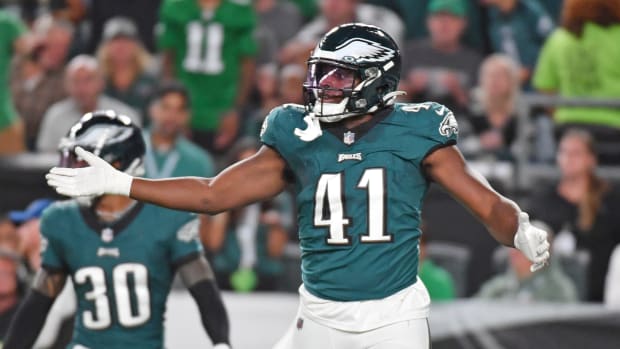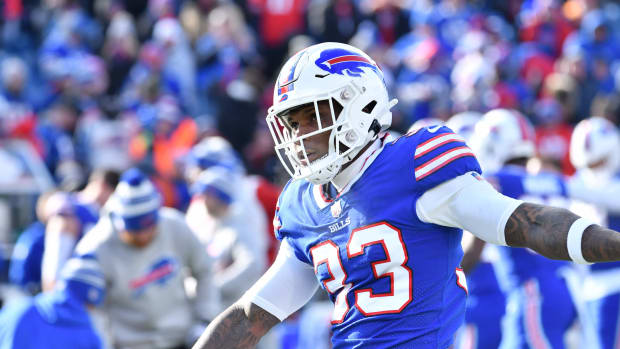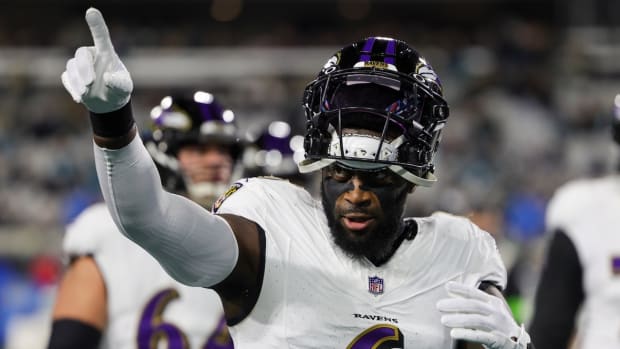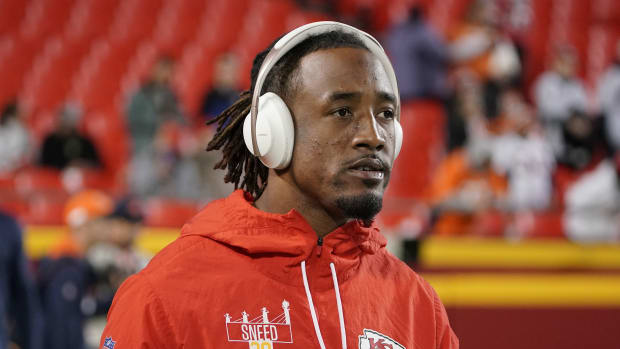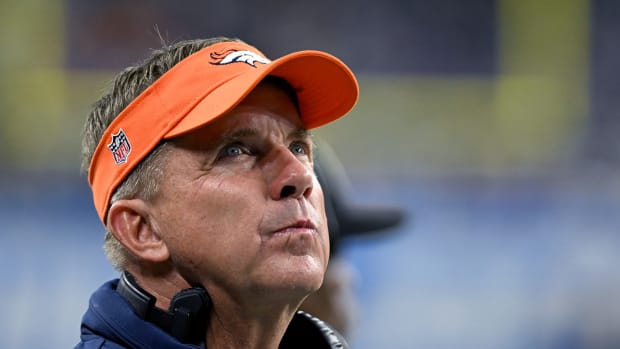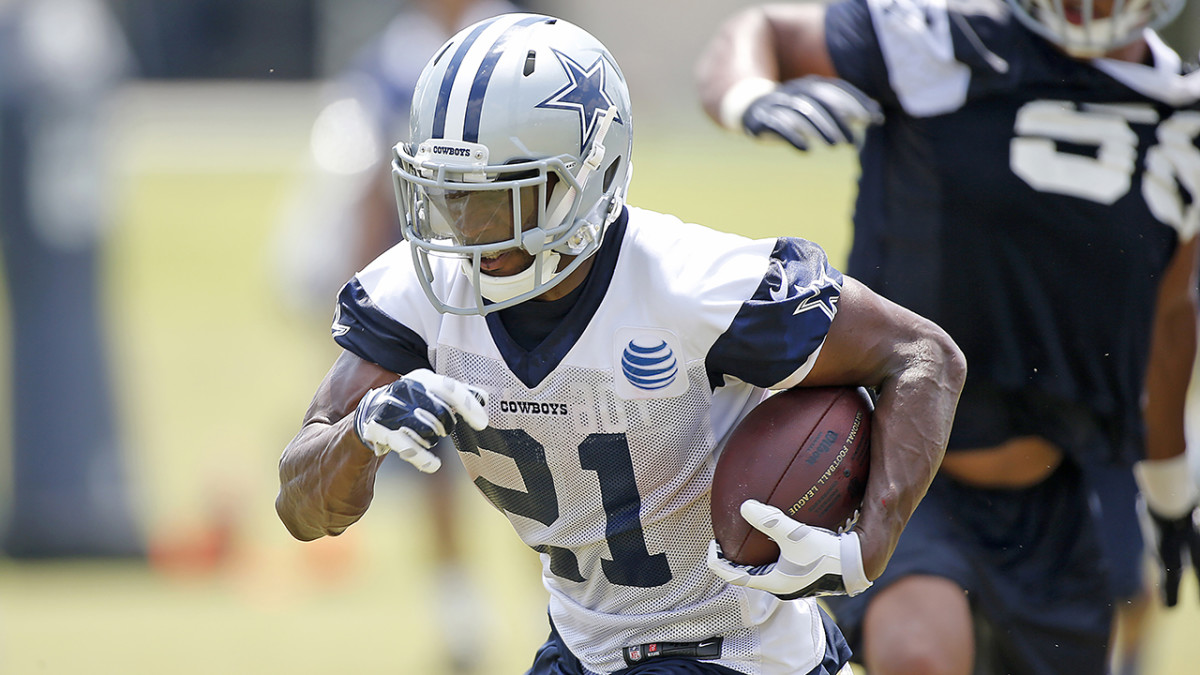
A Speech, Some Mail and Book Suggestions for Dad
To lead my last mailbag for a month, before I get to the Father’s Day Book Section, I’ve got a snippet from one more university speech for you: Princeton grad Jason Garrett’s acceptance speech when he received the Citizen Athlete Award from Princeton’s Varsity Club on May 27. (Here are the commencement snippets I wrote about Monday.) A few good notes in the section I’m reprising for you here.
Said the Cowboys head coach:
“Football is like life. I can give you 100 examples why. Teams are a lot like life. I counted up one day—I’ve been on over 200 teams in my life. It started with the Monmouth Beach Tidal Waves, down at the Jersey Shore—basketball teams, baseball teams, football teams. I think a lot about teams. Families are teams. When you're a football coach, you think about what the best teams are—and what they have.
“The best teams I’ve been on all have great leadership. Huge topic. It’s on my mind constantly. In August of 1992, I got cut by the Ottawa Rough Riders. I was a fledgling football player, hanging on by a string. Then I found myself with the Dallas Cowboys. The last preseason game. Troy Aikman: no shoulder pads on, eating sunflower seeds and a hot dog. Emmitt Smith and Michael Irvin, they’re not playing. Guys like me, it’s the biggest night of our lives. I’m going to get the second half of the game. If I play well, I’m going to be the third-string quarterback. If I don’t, I’m probably never going to play football again.
Peter King's MMQB Column
Doubts are starting to grow about Russell Wilson’s long-term future with the Seahawks. Here are three reasons I think contract talks may be in trouble. Plus, examining the Niner exodus, a Father’s Day preview and commencement speech snippets. FULL STORY
“We get the ball at the minus-2-yard line. Two yards behind us, 98 yards ahead of us. There’s a lot of guys just like me in that huddle. With one exception: Kevin Gogan. If he walked in this room right now you’d say, ‘That’s the biggest man I’ve seen in my life.’ Six foot eight, 350 pounds, the biggest hands, the biggest head you’ve ever seen in your life. He’s my roommate, he’s loud and he’s obnoxious. He drew the short straw. Guys got hurt, and he had to play the second half.
“We made three or four first downs. Things are going well. There’s a timeout. I’ve got a bounce to my step, and I come back in the huddle and say, ‘Okay guys: What snap count you want? Quick count? Hard two? What do you think?’
“Gogan says: ‘Hey Red Ball,’ that’s my nickname, ‘you’re the quarterback. You decide the snap count.’ Dagger. I think, ‘I’m the leader. When you’re the leader, grasp the mantel of leadership. You’re the quarterback, you decide the damn snap count.
“If you’re in a leadership role, lead. Embrace the mantel of leadership. I’m in charge of the Dallas Cowboys. Lead. I think about this group in here right now. Excellence. It’s palpable. You guys are leaders. Lead! Make a difference! You can change people’s lives. Whatever team you’re on, be a leader.”
I’ve been around Garrett quite a bit over the years. That sounds precisely like him.
And thanks for your feedback on the speeches. I enjoy foraging through them to find good points that a football audience might enjoy.
* * *
Father’s Day Book Section, Continued.
On Monday, I reviewed St. Louis Cardinals manager Mike Matheny’s book about youth sports, which I liked a lot. My review can be found here.
Today, I’ll add four more. As I said Monday, I’ve done this for a while, in the hopes that you’ll buy your father a book for Father's Day and we can get back to the old-fashioned hobby of reading. Remember when you used to do that? I don’t mean reading your texts and emails and football columns. I mean reading a book.
Here are four more I’d recommend that I’ve read:
Without You, There Is No Us: My Time with the Sons of North Korea’s Elite(Crown)
By Suki Kim
I simply loved this book. It’s one of the best I’ve read in recent years. I’ve always been impressed by writers and reporters who take me where I cannot go; I think it’s one of the most important things about journalism—to be able to intelligently show us places and people we’d never have seen or knew without the probing eyes and ears of the writer. Suki Kim, a South Korea native who went on to be a journalist and live in New York, is that writer. She got a job teaching at the all-male Pyongyang University of Science and Technology, and she takes us into the world of teaching and eating with and living in close proximity to her students for half a year.
I’m fascinated by a country that doesn’t allow the outside world in, and won’t allow its citizens out. That’s the world—the student world, anyway—that Kim illuminates so well. There’s a hopelessness in a university of science and technology that doesn’t allow its students on the internet. And doesn’t allows its teachers the freedom to teach what these students will need to succeed even in the very small world of North Korea.
Kim writes: We accepted our situation meekly. How quickly we became prisoners, how quickly we gave up our freedom, how quickly we tolerated the loss of that freedom, like a child being abused, in silence … Asking permission for everything was infantilizing. So we began to understand our students, who had never been able to do anything on their own. The notion of following your heart’s desire, or going wherever you chose, did not exist here, and I did not see any way to let them know what it felt like, especially since, after so little time in their system, I had lost my own sense of freedom.
Later, she wrote: For the first time in my life, thinking was dangerous to my survival.
So powerful were Kim’s words, throughout the book, that—and I rarely do this—I started underlining them in pen, like a book I’d had to take notes in back in college. I’d recommend this book if you have a curious sense of how a school, and a country, can be effectively shut off from the world.
* * *
Billy Martin: Baseball’s Flawed Genius (Houghton Mifflin Harcourt)
By Bill Pennington.
It’s usually the mark of a great biography that you get to the end of a thick book—in this case, the epilogue ends on page 503—and you’re profoundly disappointed. Give me more stories! Tell me more about one of the craziest men in sports in the 20th century!
I should say, Crazy like a fox. Martin was both a nutty baseball player and manager and a brilliant player and manager. Martin drank too much; way too much, and it probably contributed to his premature death on Christmas Day 1989 in a car wreck on a country road near Binghamton, N.Y. But what a smart, smart baseball man he was. So much of “Moneyball” was being done by Martin in his managerial stints before we even heard of “Moneyball.” When Martin did it, it was called “Billyball,’’ with much more emphasis on speed and stealing bases than Billy Beane ever would encourage. And it worked. But Martin was such a tormented person he could never stay in one place too long, or in one job too long, or with one woman too long.
This isn’t just a superbly reported book. It’s a very well-written one, from the Introduction on. The sixth, seventh and eighth paragraphs blew me away, with Pennington and a local law-enforcement officer standing at the scene of Martin’s death less than a day after it happened.
Inconceivably, Billy Martin, the big-city, bright-lights manager cheered by millions in his time, which included five loud stints as a central character in George Steinbrenner’s 1970s and 1980s mix of follies and championships, had died in the still of a lonely, pastoral road.
“Bill would probably be alive today if he was wearing a seat belt,’’ Ken Billo, an officer in the local sheriff’s office, told me at the crash scene.
Perhaps that’s true, but if there was anyone who went through life without a seat belt on, it was Billy Martin.
Billy Martin had to exist in a pre-Twitter era. Just had to. He was a living, breathing back-page tabloid headline, and he got into so many fights that were headline stories in my youth that I’d forgotten some of them. (Kayoing a marshmallow salesman in a Minnesota bar is the absolute topper, and Pennington reports it like the Watergate burglary. Priceless.)
But one thing I love about the book is how Pennington has dug up stories of Billy Martin the smart guy. Over the years, that’s the part of the Martin legacy that’s gotten very short shrift, and Pennington’s book corrects it. In the second game of the 1955 World Series between Brooklyn and the Yankees, Martin was on second base in the fourth inning. The Dodgers were up, 1-0. It took Martin two pitches to steal catcher Roy Campanella’s signals to the pitcher. Wrote Pennington: The Yankees had a preset code in this instance; if Billy raised his right leg before the pitch, it was a fastball. If he raised his left leg, it was a curve. The 2-2 pitch was a fastball—as Billy had predicted, and [pitcher Tommy] Byrne laced it to center field for a two-run single. The Yankees never trailed in the game again. Imagine—a pitcher getting a gift two-run single on a stolen sign. What a story. Which we didn’t know … until now.
Great book. I just hope Pennington has another subject in his sights, and soon.
* * *
To Kill A Mockingbird(Grand Central Publishing)
By Harper Lee.
I've never reviewed a classic before, but I decided to this year because a sequel to this Pulitzer Prize-winning novel will be published next month. “Mockingbird” is a book many of you must remember reading under duress in high school or college, or a story most of you know from seeing the movie with Gregory Peck as attorney Atticus Finch. Either way, it's a story worth revisiting. While the second half of the book focuses on the shocking 1935 trial of a black man, Tom Robinson, accused of raping a white woman, the story is just as much about siblings and the bonds and secrets they share. It is a detailed portrait of a rural town in southern Alabama during the depression that examines racism, classism, and gender roles through the eyes and imaginations of Finch’s young children, Scout and Jem. The book is crammed with stories about life in fictional Maycomb, Ala., the mysterious unseen neighbor Boo Radley and a town filled with characters that fascinate and frighten young Scout, a scrappy tomboy and the precocious narrator of the story. Lee allows Scout, with her innocent clarity, to sort out good from evil.
Even as she takes on immense themes, Lee never fails to entertain. Scout, Jem and friend, Dill, plot ways to get a peek at the reclusive next door neighbor Boo, though all three are terrified they’ll actually see him. The children later find Boo to be their savior. I should note that Jem is a football fan who reads college football magazines. The book opens describing a broken elbow injury that 12-year-old Jem worried would ruin his chances to play football. It didn't, but caused his left arm to be shorter than his right. Jem, Scout tells us, “couldn't have cared less, so long as he could pass and punt.” Good boy.
Lee’s upcoming sequel is the first manuscript that Harper Lee wrote more than half a century ago. It’s a story set 20 years after the events in “Mockingbird” with Scout as the adult narrator who returns home to Maycomb. Lee's editors were taken with the flashbacks in the manuscript and told her to write a story from young Scout's point of view. She did and the result, “To Kill A Mockingbird,” has been one of the largest-selling novels in history, one that sits atop most lists of the greatest American novels. Few knew that Lee had ever written another manuscript. It was assumed lost until her lawyer found it among her archives last year. The sequel, “Go Set A Watchman,” will be published July 14 and is the most preordered book of all time.
* * *
Gray Mountain(Doubleday)
By John Grisham.
Well, you knew I’d put a Grisham on this list, didn’t you? I’ve recommended several of Grisham’s books in the past, and I’m very bullish on this one. Not everyone loves the sameness of Grisham’s work. There’s a formulaic nature to his books—most of them; certainly not “Playing For Pizza”—but the reason I like them is they’re always page-turners. When I start one, I know it’s going to involve two or three late nights, because I lay there in bed reading, and invariably I look at the clock, and it’s 2:39 a.m., and reluctantly I have to put the book down or else I know I’ll have to slog through the next day with zombie tendencies.
“Gray Mountain” was a three-nighter. A laid-off young New York lawyer, Samantha Kofer, accepts an internship with an Appalachian legal-aid clinic and meets a smart country attorney who is certain his father was cheated out of his rightful sale of property to a coal company. This attorney, Donovan Gray, makes it his life’s purpose to sue the tar out of coal companies for the rest of his life—which ends prematurely, and with reason to think it’s foul play. The Samantha character is the typical Grisham altruistic hero of the book, and a very good one—particularly late in the book, when lives are in danger in the middle of some very deep and dark woods of Appalachia.
One point about Grisham: You usually know where he stands on the issues from his books. And here, you can tell he empathizes with those who love the land and love the pristine Appalachian countryside—and not with the coal companies. For better or for worse (I love writers of fiction who lay their political views on the line in their books), Grisham weaves a worried tale about coal mining and the victims who get in the way of Big Coal. He does that while doing his usual good job in producing a smart page-turner.
* * *
Now for your email:
ON RUSSELL WILSON AND THE SEAHAWKS. Could you see a scenario where Russell Wilson shows the Seahawks just how versatile he is and takes a fully guaranteed baseball contract to play for the Rangers? He already has a Super Bowl ring—why not try for a World Series ring and get all his money guaranteed?
— Chris, Charlottesville, Va.
The MMQB ICYMI
New Eagles corner Byron Maxwell guarantees a trip to Super Bowl 50. FULL STORY Peter King’s offseason power rankings. FULL STORY Emily Kaplan’s 10 Things I Think I Think. FULL STORY Football forced Nick Hardwick into a lifestyle of competitive eating. When he stopped playing, the pounds melted away—and so did part of his identity. FULL STORY A season-ending injury for left tackle Ryan Clady isn’t a big deal; the real question is how Gary Kubiak will meld his offense with Peyton Manning. FULL STORY Yahoo lands NFL’s first Internet-only broadcast. FULL STORY Simplifying the contracts of first-year players has had unintended consequences, especially for agents. FULL STORY
I can’t see it. Russell Wilson batted .229 with 118 strikeouts in 93 low-minor-league games. Is it possible that he could make a go of it and make the majors? Sure. I wouldn’t put anything past him. But what major-league team is going to guarantee a player with that track record the kind of annual money he can make as a good starting NFL quarterback?
ON ANTHONY DAVIS AND THE 49ERS. If Anthony Davis returns to football in 2016, would he still be under contract to the 49ers?
—David, Rockville, Md.
Yes, under the same terms he’d have played for this year unless the deal is renegotiated.
ON THE TREND IN SAN FRANCISCO. After Anthony Davis jumped on the train out of the NFL, I started to wonder if there's more to this than meets the eye. At first I thought it might be some intelligent men not willing to be bullied by the league office. But most of them are 49ers, with Jason Worilds as the outlier. Do you think this may be some sort of fallout from Jed York and Trent Baalke's treatment of Jim Harbaugh?
—Pat, Corvallis, Ore.
I don’t see it that way. In the end, players play, and they play for whatever coach is there. I also don’t think there was universal love for Harbaugh in the locker room either.
ON YAHOO’S INTERNET-ONLY GAME. Was wondering if this possibly was the beginning of the NFL providing fans the ability to buy individual viewing of specific games at a reasonable price? In other words, instead of buying the NFL ticket to see every game (99 percent of them I have no interest in; I am a Raiders fan stuck in Texas) the fan/customer would be able to select specific out of region games of their choice. Could this be what the NFL is leading to?
—Ron, Texas
The NFL can’t take many games off TV between now and 2022. That’s the last year of the current television agreements with all the league TV partners. And a lot can, and will, change in the next eight seasons. You're a la carte idea is a very interesting one. And the NFL being the smart business entity that it is, I’m sure someone in long-term planning is thinking of that as an option for the next TV/media deal beginning in 2023.
ON GRADUATION SPEECHES. Martha Raddatz's quote that she encouraged graduates to recite, ‘Of course I would love to work late,’ is neither a good story nor a good lesson. It's an asinine message that reflects the perverse obsession with work that is far too prevalent in this country and particularly in the northeast corridor where Ms. Raddatz resides. This mentality often leads people to severe fatigue, clinical depression, heart attacks, substance abuse, obesity, and in many instances an early trip to the cemetery for a prolonged nap. If you don't believe me, find a bench near a subway station after hours in Manhattan, sit down with a cold beverage, and do some people watching and keep count of how many people look like they are walking around dead. If you want to keep an accurate count, I suggest bringing a notebook and a pen. You gave a good effort trying to find some of the aforementioned good stories and lessons, but how about next year you try and find an excerpt from a speaker who encourages graduates to find some balance in their lives. Best of luck on that.
—Dave, New York
You’re probably right. I’m reminded of one of the first jobs I ever interviewed for, in which I was advised, “We don’t look at the clock here, except for deadline purposes.” I get what you’re saying, and I agree that work-life balance in many industries is awful. But I think if you want a good job, and you want to advance in that good job, you’d better not be committed to a 40-hour week. That’s just life.
ON BASEBALL AND THE INJURED BOSTON FAN. I know your column is an NFL one, but this is about the quietest portion of the NFL year and I also know you’re a baseball fan and formerly lived in Boston, where you attended your share of games at Fenway Park. So, my question: The fan at Fenway Park who was struck by a broken bat is expected to survive. I’m very thankful to hear that. As someone who frequently takes his daughters to games, it was a nightmarish scene to see even on television. I’m curious what your thoughts are about protective netting at ballparks? The players’ association seems to have already thrown the owners under the bus for this, even though there are articles suggesting maple bats break far too often just as the one did in this instance. What would you do if you were baseball’s commissioner?
—John, Spokane, Wash.
Great question. Tough question. When I go to a baseball game in an unfamiliar stadium, and I need to buy a ticket, I often like to sit down low, and close to home plate if anything’s available. But I always say, “I don’t want to be behind the screen.” I don’t like sitting behind netting in hockey or in baseball because it affects the view of the game. So, selfishly, I would not like to see the netting extended to the dugouts. When I sit close, I watch every pitch closely and do not worry about the danger. But, and this is a big but, I would understand if the screens were extended to make the seats safer.
Follow The MMQB on Facebook, Twitter and Instagram.
[widget widget_name="SI Newsletter Widget”]













































